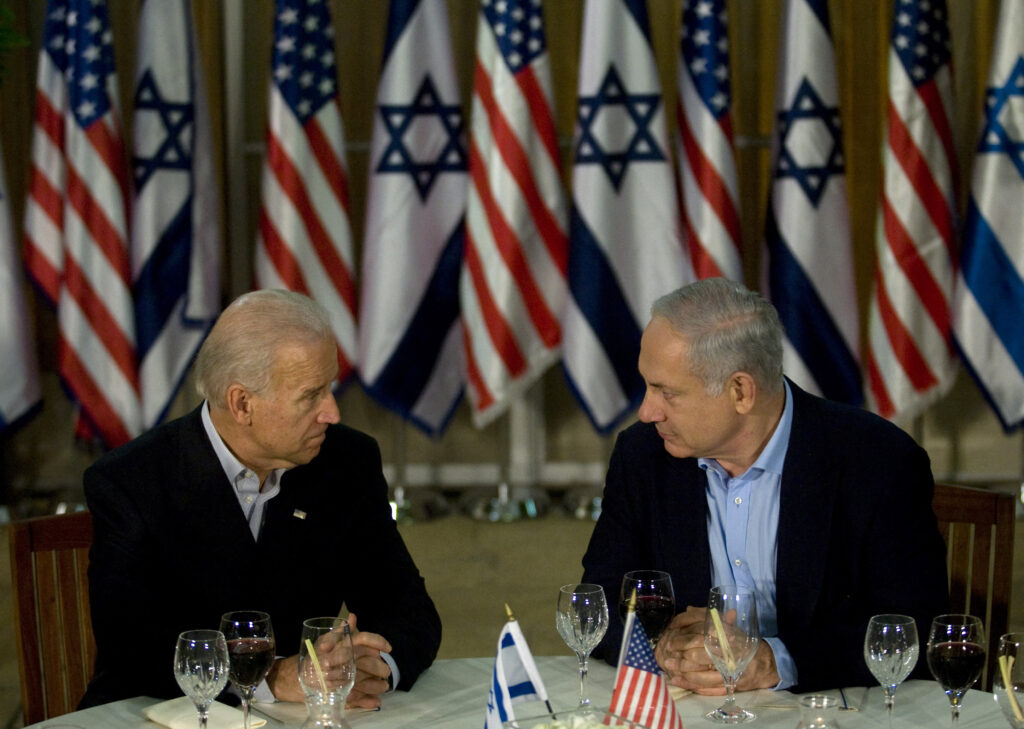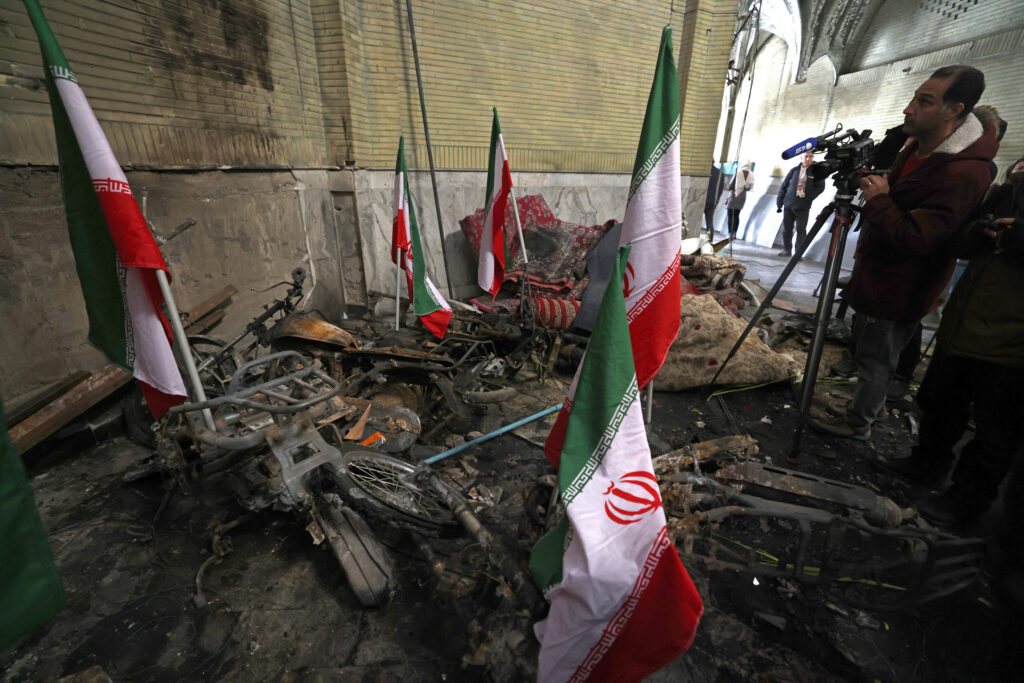By Clemens Chay, Research Fellow, MEI-NUS
As Israeli tanks rolled into Rafah under the pretext of conducting “targeted strikes”, questions remain over a possible intensification. Israel has mulled over the launch of a full-scale invasion of the city for some time, despite international pressure, particularly from the United States, against such a move. The decision to move into the southernmost part of the strip a week ago would have appeased — momentarily, at least — Prime Minister Benjamin Netanyahu’s far-right coalition partners.
Mr Netanyahu’s refusal to heed warnings from Washington and elsewhere reflect the challenge to his authority from within his government, and a willingness to ignore Israel’s irreplaceable ally. In response to President Joe Biden’s recent order to withhold a shipment of heavy weaponry — a bid to force Israel to recalibrate its tactics — Mr Netanyahu vowed that the country would “fight with its fingernails” if it had to.
This defiance is a result of pressure from two of the most radical figures in his Cabinet. National Security Minister Itamar Ben-Gvir’s warning of “implications” if Israel chooses to accept a “reckless” ceasefire deal with Hamas has played a role in torpedoing growing hopes of a halt in hostilities. Finance Minister Bezalel Smotrich’s repeated refusals to meet Mr Netanyahu to discuss ways to lower the cost of living, which have been driven up in large part because of the war, were meant to prod the government into taking action against Rafah. These ministers, among the most vociferous advocates of a ground offensive, have Mr Netanyahu in a bind: If he does not do their bidding, they could bolt his coalition, triggering an early election which would likely result in a heavy defeat for the Prime Minister.
A Biden-Bibi Breakup?
When Iran threatened to engulf the region in a wider war in April, Mr Biden reiterated his “ironclad” support for Israel. But as the focus returned to a ceasefire deal, concerns over the inability to find common ground, and a potential humanitarian disaster in Rafah, have magnified the fracture between the US and Israel. Mr Biden took pains to emphasise that his decision to block a shipment of “high-payload munitions” was taken to avoid civilian casualties, not Israel’s ability to defend itself.
In any case, the move has more symbolic than practical value. As Bilal Saab, a former senior adviser in the Pentagon’s Office of the Under-Secretary of Defense for Policy, wrote in a LinkedIN post, the decision has “no bearing whatsoever on Israel’s warfighting capacity”. In personal correspondence with the author, Grant Rumley, a senior fellow and a specialist in Great Power competition and the Middle East at the Washington Institute, remarked that reviewing arms shipments was the result of a “deliberative process” that lasted more than a month. It was part of an escalating series of actions — Mr Biden’s “come to Jesus moment” remark after his State of the Union address, and Senator Chuck Schumer’s call for new Israeli elections, among others — following Washington’s assessment that Mr Netanyahu was bent on disregarding US counsel.
What is clear is the political significance of the US decision. Mr Rumley said that halting the shipment represents Mr Biden’s “first public break with Bibi since the war started”. “Even if the US was to resume these shipments, the marker has been placed,” he said, adding that it is a “turning point in the war, effectively”. A recent Wall Street Journal investigation revealed that the sale of up to 6,500 Joint Direct Attack Munitions (JDAMs) — kits that allow “dumb” bombs to be converted to precision weapons — has been held up since January. Washington has also not advanced another US$1 billion worth of transfers for Israel that include tank ammunition, military vehicles, and mortar rounds. The delays reflect not only Mr Biden’s domestic pressures, but also how Mr Netanyahu has driven the US President up the wall.
The Right-Wingers are Far from Setting Things Right
Mr Netanyahu’s extreme-right bedfellows have hurt him and the country’s image. In January 2023, Isabel Kershner, a correspondent in The New York Times’ Jerusalem bureau, explained that “extremely ideological” right-wing parties in the coalition have not just received concessions from Mr Netanyahu, but have also “incited anti-Arab racism” and “claimed more authority over Jewish settlements and civilian affairs in the occupied West Bank”.
These elements are determined to prevent the return of Palestinian workers within the Green Line — limiting them to the West Bank. This has been accompanied by raids that have seen more than 7,000 West Bank Palestinians arrested and held under “administrative detention”. A Wall Street Journal investigation has also found illegal settler roads surging across the area since 7 October. Mr Ben-Gvir has been particularly incendiary, inciting violence by distributing 10,000 rifles to arm settlers and civilian security teams. He also publicly declared that the right of life for Jews is worth “more than the right to movement for Arabs”, and even chose to visit Temple Mount thrice, jeopardising what the US calls the “status quo”.
The failure to penalise perpetuators of settler violence, apart from sanctions on a handful of them, amounts to informal annexation. This is the legacy of the Oslo Accords, which, despite allowing for limited self-governance, did not explicitly forbid settlement building, nor the proliferation of bypass roads.[1] In stark terms, this was in no small way responsible for the horrors of 7 Oct. As settler activity beget violence from the Palestinian side, the Israel Defense Forces were forced to deploy to the West Bank city of Jenin last July, affecting the operational readiness of Southern Command, which is responsible for protecting the borders with Gaza. Settlers remain undaunted, however: They have even attacked aid convoys headed for war-torn Gaza, leaving food and other essentials meant for starving and ailing Palestinians rotting by the wayside.
Bibi’s Goal of Self-Preservation
Under pressure for failing to keep Israel safe and ensure the safe return of the remaining hostages, Mr Netanyahu has opted for self-preservation. The PM’s only plausible way to avoid a reckoning is to stay in office, Adam Garfinkle, an American political scientist who was formerly the speechwriter for US secretaries of state Colin Powell and Condoleezza Rice, told the author in an interview. This, he said, means that Mr Netanyahu will “drag out the war”, noting that the Israeli leader also faces personal peril if he is trumped out of office — corruption charges which could land him in prison hulk in the background. For these reasons, many have doubts that a ceasefire is high on Mr Netanyahu’s list of priorities, although one appears within reach. For the Prime Minister, war remains the answer to his predicament.
Is Israel’s Image Beyond Repair?
Self-preservation notwithstanding, Mr Netanyahu cannot ignore the polls, both in-country and abroad. According to data shared by Morning Consult, a business intelligence company, with TIME, net favourability of Israel among 42 out of 43 countries polled dropped by an average of 18.5 percentage points between September and December 2023. Countries such as China, South Africa, Brazil, and several others in Latin America went from viewing Israel positively to negatively. The exception is the US, which still has net positive views of Israel. But where Mr Netanyahu is concerned, a majority of Americans (53 per cent) surveyed by the Pew Research Center in April expressed little or no confidence that he would do the right thing in world affairs.
Domestically, trust in the Prime Minister’s leadership remains low, and dwindling, from 28 per cent to 23 per cent, according to findings by the Israel Democracy Institute. What divides the Israeli public — and, perhaps, explains Mr Netanyahu’s stubborn pursuit of his policies — is the question of priorities. According to a poll conducted by the Israel Hayom newspaper, Israelis are split almost evenly between getting the hostages freed (46.6 per cent) and victory over Hamas (48.8 per cent). These results suggest strongly that as long as he continues the war, he can expect strong backing. More worryingly, his dogged resistance to resolving the Palestinian question also has the support of a majority of Israelis: A survey conducted by the Israel Democracy Institute revealed that about two-thirds (63 per cent) of citizens are against an agreement in principle for an independent and demilitarised Palestinian state.
The picture from the other side is simultaneously ominous. While Gazans increasingly back a two-state solution, relative support for Hamas remains high. The latest public opinion poll conducted by the Palestinian Center for Policy and Survey Research show that 34 per cent of Palestinians surveyed expressed support for Hamas as a political party. Although this represents a nine-point drop from a similar poll in December, the number is significantly better than it was pre-7 October — in September 2023, only 22 per cent expressed support for Hamas.
The “day after” picture is similarly discomfiting. Despite the destruction triggered by Hamas’ attacks on 7 Oct, 59 per cent of Gazans’ prefer to see it remaining in control after the war ends. This compares to just 11 per cent who want the Strip to be under the charge of a Palestinian Authority led by Mahmoud Abbas, and 13 per cent for a PA with someone else in charge.
Israel’s shredded image around the world, its battered relationship with the US, and continued strong support among Palestinians appear to have validated the strategic gambit to achieve just such results employed by Yahya Sinwar, Hamas’ most senior official on the ground in Gaza.
Taken together, the undeclared aims of top leadership in both Israel and Hamas make it unlikely that there will be peace anytime soon. One need not look much further than recent events to arrive at this conclusion: The latest round of ceasefire talks swung from non-starter to tantalisingly within grasp when Hamas accepted an Egyptian-Qatari proposal on 6 May. The very next day, Israel moved into Rafah.
Image Caption: US President Joe Biden and Israeli Prime Minister Benjamin Netanyahu at a dinner in Jerusalem on 9 March 2010.





